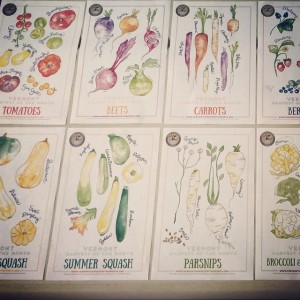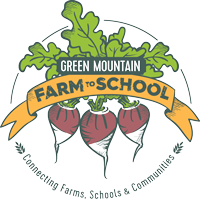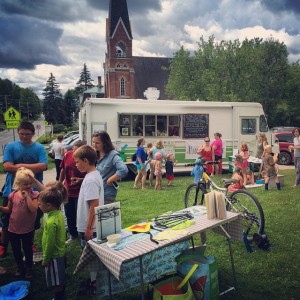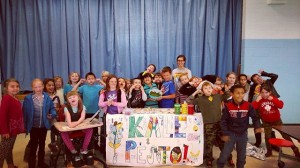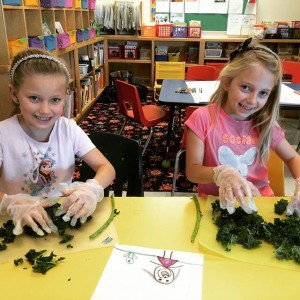112. Rebecca Mitchell | Green Mountain Farm-To-School | NE Kingdom, Vermont
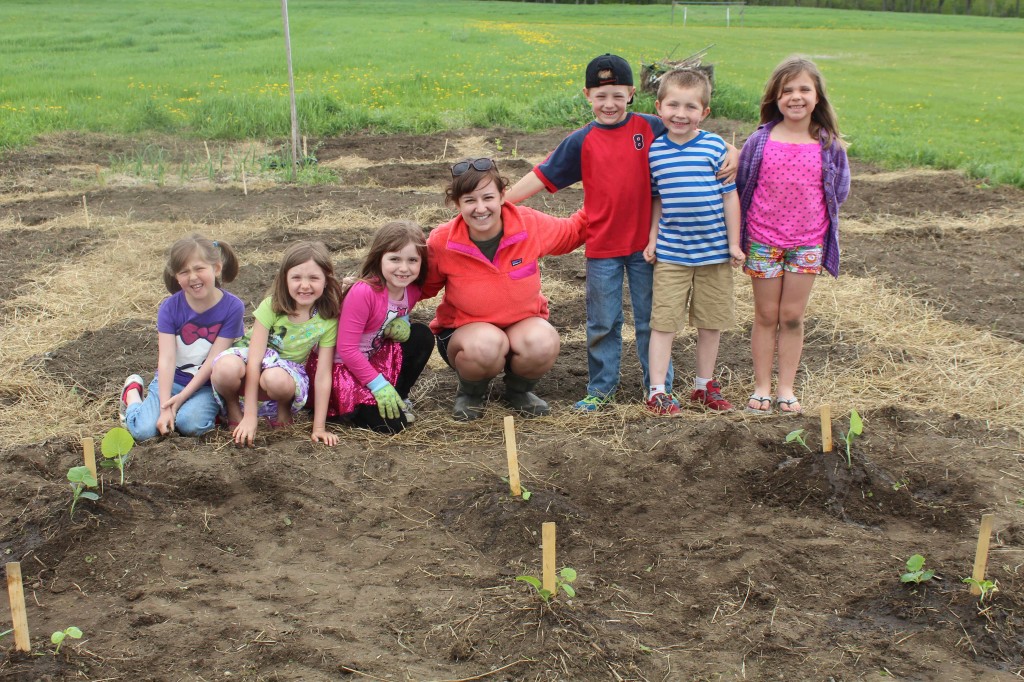
Farm-to-School
Today we’re going to learn about 2 of my passions teaching children and gardening and how to promote healthy eating and gardening in our schools. My guest, Rebecca Mitchell is from the Green Mountain Farm-to-School (GMFTS) who’s mission is to restore and strengthen local food systems in the Northeast Kingdom of Vermont by promoting positive economic and educational relationships among schools, farms, and communities. They create healthy communities by working across the food system with capacity building, resource development, and technical assistance through GMFTS’ school gardens, Farm-to-School Program, food hub, food truck, and statewide marketing campaign.
Tell us a little about yourself.
My name is Rebecca, Becca Mitchell, I grew up in Burlington VT, and for the last 2 1/2 years I’ve been working and living in the NE Kingdom. That’s the 3 NE counties in the state of Vermont up by the Canadian Border. I have a background in Environmental Science and got into education working as support staff working at a pre-school when I was a college student from there my path led me to farm-based education which led to Farm-to-School programing. Working with mostly elementary aged school children, connecting them to where their food comes from, through hands-on learning experiences, mostly cooking, gardening, and all kinds of things like that.
Tell me about your first gardening experience?
Yeah! I love that question! I was born in Allentown, PA which is more of an urban area then VT. I remember having a small garden in our backyard. I lived with my parents and grandparents. I remember tomatoes predominately and loving eating fresh tomatoes from the yard, and being fascinated by that growing process. So my family created a little garden plot for me, where I got to tinker with planting seeds and trying to grow things. It wasn’t super successful because I was pretty young at that point but it was nice to be able to get outside attempt to grow some things and play in the dirt. My interests have continued to grow and my knowledge of gardening has expanded there as well.
Environmental Science/Studies Degree
Tell us a little about becoming an Environmental Science Major. Because I had a guest Neva Hassanien, on from UMT and I was telling here when I first came to Montana and when I went to school I didn’t even know that was major.
So, I went to a pretty small lib arts school Moravian College in Eastern PA. Part of the curriculum there is really just taking classes though a broad range of disciplines. My freshman year I took an intro to Environmental Studies course, and had a really wonderful professor there, and as an intro course it had a broad overview of Environmental issues so I was inspired by that. One of the beauties of liberal arts education is it’s pretty fluid so I wasn’t locked into a major at that point. I went into school undecided, actually leaning towards more of an English degree, but I really ended up loving EVST and sciences, so pursued that and had a lot of really wonderful opportunities in school to have hands-on experiential learning.
I did an undergraduate research project my junior year of school, studying stream ecology, so catching fish and macro invertebrate. Studying water chemistry as well as doing an internship at a hydroelectric facility my senior year. I had a wonderful group of professors and advisors who made following the path to EV science easy and exciting for me. This has been a little bit of a step going from those water based sciences to gardening and food education its a path that made sense to me. I think the background I got in school has aided me in the work
I get so frustrated with kids who say I don’t want to college because I don’t know what I want to be but I think a lot of college is figuring that out and I think it’s so interesting you went form being an english major to being a science major and water chemistry. It really shows you, that you learn so much about what you want to do, there’s all these jobs you never heard of your sitting next to someone who’s like yeah my cousins’ best friends niece does this you’d love it. And the next thing you know it your doing something you didn’t even know existed!
What does organic gardening/earth friendly mean to you?
Yeah! I think organic gardening or your term friendly gardening is being conscientious about gardening practices. As an organization we do a lot of school gardens, obviously they aren’t certified organic but we generally follow organic practices and just staying with your roots and being respectful and gentle to the earth. Especially when you’re working with kids there’s no need for chemicals to go into the gardens where we’re working.
What are some of the things you plant with the kids. Tell us about the schools
NE Kingdom makes it sound super swanky and exciting, and it is beautiful! It’s the rural northern part of the state.
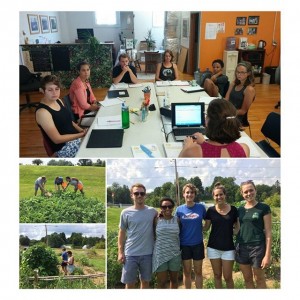
So our program works with about 25 schools in the area, facilitating their schools gardens. That program can vary. In some of the schools it is after school where we work with a small group of kids in the garden. For other schools it’s all kids all classes who are involved in that gardening process. Generally we have our pool of Americorps members who are generally the boots on the ground facilitating those gardens.. That’s what I did for the past 2 years, now I’m in a staff position with the organization which is a little bit different.
Basically you’re assigned to 3-4 different schools, and you’re responsible for going out in the fall, harvesting with the kids, washing the food, weighing it, bringing it to school kitchen, service staff. That can be integrated into school lunches or a community dinner during the school’s fall open house. Kids are really getting to see a holistic prices there.
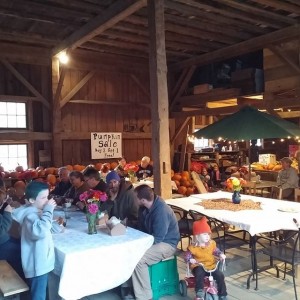
Then in the spring students get to do seed starting, planning what the garden looks like, then physically prepping the beds. So lots of dirty hands, lots of excitement in the garden!
So my big question that has always made me wonder as a teacher, is what do you do during the summer, when school is out? How does that piece work?
Totally. Our hope is always to have parents, families, community volunteers coming out to help tend the garden during the summer. The interest varies with the town. We try to make the garden a community resource that is accessible where they can come do a little bit of weeding and a little bit of watering, hopefully getting the students and parents ownership over the garden.
Keeping in mind, things happen, people aren’t always able to come out. So we make it a point to make sure the staff visits the gardens regularly during the summer, to help tending the beds, harvesting, weeding, watering, all those good things. I think it’s an ongoing process to get those pools of volunteers built up for the garden.
How do you get funded?
We have funding through a number of different outlets. We have a couple of programs different from our actual in school programs. But we get a lot of grant funding, donations from both corporations and individuals. It varies, and my supervisor would be able to better to explain the nitty gritty details of where funding comes from.
For in school programs, I think we do ask schools to pay a modest yearly fee, to cover cost of mileage, and time to come in to supply and activities. I’ve heard from schools it’s a pretty modest fee in comparison to other things they have built into their budgets.
How big is your area if you’re covering that big of an area?
NE Kingdom is 3 counties. A lot of our schools are in the middle areas there, which is Orleans County. Newport where our office is located is in that county so lot of schools are there, some in the surrounding counties of Essex and Caledonia. They’re pretty spread out doing a lot our Farm-to-School coordinators do a lot of driving over the course of the year to visit all of those sites.
But like 50 mile radius or 100 or 200 miles?
Probably 50 miles.
So tell us what kind of things you plant with the kids?
What have a list of certain crops that are kind of universal across all of our school gardens and then beyond that there’s flexibility, depending on what the food service director is interested in having in their garden, what the kids are passionate about planting! In general we always plant in fall:
- garlic
In the spring we plant:
- kale
- winter squash
- tomatoes
- carrots
- beets
- potatoes
I think there’s a list of about 10 crops we always plant. Kind of keeping in mind you don’t want to plant all tomatoes and then have blight come and wipe out your entire school garden so thinking about diversity of crops. Different texture, different colors, making the gardens aesthetically interesting. Different growing timelines, so we’ll have radishes in the garden, they grow pretty rapidly so that’s a little more exciting and the kids can actually see things coming through a little more quickly!
There’s a lot of consideration in what we plant in the gardens, I think that list has been developed over the course of the devon or eight years the program has been in place. We also want to keep in mind the school cooks if they are the ones utilizing what we are harvesting from the garden, we definitely want their input about what goes into the garden so if they are really passionate about broccoli or something else we always want to make sure we have that covered in the garden so we actually see what gets harvested in school meals.
How does someone get started, or get schools involved if someone is interested in getting a Farm-to-School program in their community?
Once I started with the organization, we had a lot of schools, our pool of participants has been built up over the last years, but we definitely have other schools who are interested in programing want to sign on, and don’t really know where to start, but I think coming from the organizational standpoint and getting a school signed on.
I think garden-based education, and farm-based education can cover a lot of subjects, it’s experimental learning which I am a big advocate for. There’s science involved, mathematics involved, you can integrate history really readily. So I think the resources and a little bit of start up can take some time, but once you have a garden established or even a small plot, I think the benefits are really apparent. So trying to get schools on board with things, it’s a pretty easy sell, in my opinion!
And also perhaps coming from Vermont is a state that has a has a lot of momentum behind the Farm-to-School movement. So there’s a lot of demand for this kind of programing up here, which may not be the case in other parts of the country. But I think our organization is working in the northeastern part of the state and we have a lot of regional organizations around VT doing similar work in the communities. Yeah! I just see a lot of benefits to the programing, I think as long as the schools are willing to invest a little bit of time and money in the beginning there are a lot of awards. It’s relatively easy to get a parent or volunteer to spearhead those initiatives, all it takes is one passionate individual to get things started.
Farm-to-School Movement
What else would you like to talk about?
I would love to touch base about some of our other programing really quickly. Our organization is Green Mountain F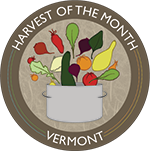 arm-to-School roots are in the Farm-to-School movement and connecting kids to food and gardens and farms, but we do have a lot of other great initiatives that are interconnected. I’m involved with them, mention them really quickly.
arm-to-School roots are in the Farm-to-School movement and connecting kids to food and gardens and farms, but we do have a lot of other great initiatives that are interconnected. I’m involved with them, mention them really quickly.
We have a statewide campaign the Vermont Harvest of the Month, that highlights a local in season fruit or vegetable each month that provides educational materials for schools and other institutions to utilize.
We have the Lunchbox which is our Food truck and summer service program.
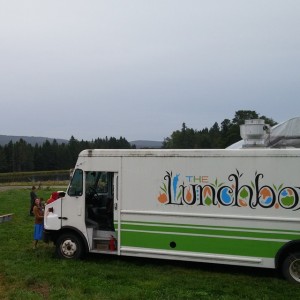
Each summer we have 10 weeks of free meals for kids, we try to source as many ingredients locally as possible. WE also have a food hub called Farm Direct, helping retailers like schools and hospitals and other institutions procure local foods. For the schools might be getting 150 lbs of produce out of your school garden on any given year, but if you want to supplement that thorough out the year with other local produce we help make that possible.
The Farm-to-School is the backbone of our organization but we have a lot of other exciting initiatives to promote local food in our communities.
That’s awesome because I think one of the barriers to starting a garden or farm is where are you going to market your produce so you’re kind of helping not just the kids at school, but also the local farmers.
Yes it’s a mutually beneficial process.We’re seeing our kids, getting excited about vegetables and we’re seeing local foods in their cafeteria. And we’er seeing farmers down the road, are also getting that economic boost of those additional sales and it creates extra markets to sell their products! IT’s really awesome and something that I’m excited to be a part of!
Are there any tips you could give farmers or gardeners if they want to become one of your producers. Are the a list of requirements they have to follow?
I think we do have some guidelines, we have a staff member who’s responsibility who’s coordinates our food hubs. We have a set of producers, but sometimes we have farmers call who say this is what I am growing? Or I have an excess of this crop? Do you have the flexibility to sell it?
So you don’t know till you ask? We’re lucky to have the food hub as a resource in this area. If there are farmers in the other parts of the country it’s great to make that connection because even if things don’w work out right away making those connections down the line, if the food hub needs winter squash and then they;ll call your farm, so making your connections never hurts!
I’ve always thought that a business could be made form just supplying carrots or potatoes to the schools would keep a person busy, and they’re easy to store, I’ve just been trying to figure that piece out.
The Lunchbox Food Truck
Tell us about the Food Truck?
Yea! I’d love to.
The Food Truck – the LunchBox, we just wrapped up our 3rd summer of meal service. The Food Truck – the LunchBox’s actually an old delivery truck that got gutted and refurbished to be a mobile kitchen and food truck and we drive around to 3 different communities in the summer and provide free locally sourced meals for kids. So anyone under 18 can come get a free meal during those designated times.
It’s a summer food service program so it’s federally funded. We aim to get as many of our ingredients locally as possible. I think last summer, 60-65% of our purchases in terms of ingredients and produce was locally grown. It’s free meals for kids, we also have adult meals available for purchase. At pretty reasonable prices. The area where we are working has a lot of poverty and has a lot of food insecurity. I think there are1 in 3 kids in the NE Kingdom. During the school year there are a lot of kids who rely on their school breakfast and lunch program. During the time over the summer they may not have access to food or healthy food.
Definitely not healthy food.
We want to provide that so our meals follow the USDA summer food guidelines, so it hits all those nutritional markers. It’s:
- freshly made
- locally sourced
- delicious
I know I ate a lot of food from the truck over the summer. And in addition to meals, we do little taste tests and cooking demos so there are hands-on cooking activities on site. At one point we had a summer reading event where kids got to come get free books at one point. We had bicycle safety demos so we’re trying to create a more holistic meal experience. Not only getting a great free meal, but also learning something and having fun and getting to connect with other members of the community.
What is the most popular meal of the summer? What are they all clambering for?
We had a lot of requests for spaghetti and meatballs.
Really?
Yes, so that was one that we actually put on the menu, because kids were asking for it. WE had a variety of meals, Tosca who was our head cook was really creative and had great choices for the kids, as well as great options for the adults. There was always soup salad sandwich available for grownups. At a reasonable price. 
We had a series of different cold soups and gazpachos and there was a few grown ups who were super passionate about that who came out every week to see what the offering was. It was exciting and nice to see new faces the same families coming back each week and trying new foods and socializing. It became a really nice community event.
Tell us about some of the lessons you do with the kids in the gardens.
So we have some written curriculum that can help guide our garden education. In the fall we have a lesson around garlic that culminates the group planting garlic for the fall. There can be different activities. I really like to harvest with the kids and then make a quick snack with whatever we make. Whether that’s a a fresh salsa, or pulling out carrots from the garden and making hummus as a quick dip.
Nice! Because I’m so sick of the schools always serving ranch dressing. (And as a side note, I made guacamole the other day and my kids were willing to taste it and try it!)
If you have a food processor, it’s just a few simple ingredients and kids love it!
We’ve made kale pesto which is super well received!
Ooh I need to get that recipe!
Yeah! I can send it your way.
I’m a little biased. I really love tying in cooking activities with gardening lessons, I see it as a natural fit! Kids react really positively getting a snack at the end of the day! As I said previously there’s a lot of easy ways of adding math and counting and measuring to your garden activities! Whether it’s guessing how much potatoes way and figuring out the difference is between your guess and the actual weight is. Or measuring the distance between starts your planting in the ground. You can tie in history really readily! You can add in writing activities!
How can you tie in history?
Im thinking about the three sisters concept of gardening.
Cool!
Beans, corn and squash being planted together. That’s a historical gardening technique. It might go over the heads of kindergartens or first graders but if you have older or middle schoolers it’s a concept they can definitely grasp. The historical concept of that gardening practice. VT has a pretty rich agricultural history, so I thinking about the history of maple sugaring and dairy and sheep in our area provides a lot of inspiration for Farm-to-School lessons up here. Garden education is really wonderful. Even if it’s just getting kids excited to be outside and play in the dirt I think that’s a win, even if they don’t learn how people gardened years ago. Just planting that seed, getting them interested in gardening is awesome! I think this is the time in their lives to get them interested in where their food comes from.
I don’t think people realize how far away from that we’re getting away from that. I had a guest here in Montana who got started when she started subbing in the schools and she had a student who didn’t know where a potato came form and that it grew in the ground. Patti Armbrister went from there and has taken it to extreme levels. And then she went on to getting locally grown meat, especially in Montana which is a big cattle, ranching community and said why are we importing beef from Texas. They worked it out so they are getting it from a local food processor.
Did I ask you what grew well this year?
This summer I was not in the gardens, I was actually working with the Lunchbox our Food truck, so I don’t know what our best crop was. I didn’t get a lot of school garden time this summer. I know we did a lot of cooking activities and taste tests in our schools around kale, last month. Our November Vermont Harvest of the Month is kale, a lot of our schools still had that in their gardens. It’s one of those crops that only gets a little sweeter once it has had a light frost. So that always holds up well and is a school favorite among our students.
Kale Pesto, and Kale Salad! That’s usually pretty consistently grown we’ll and well received by our students!
That’s great because I would think Kale would be a little more difficult to get students to eat. I had no idea you could make pesto from anything besides bail before I started this podcast.
That’s been a real recent discovery for me too. It’s been nice working for this organization and making those connections between different Farm-to-School coordinators and lots of school cooks, lots of creative recipes coming out of those collaborations. Kale pesto is super delicious, kale is so versatile iim just a kale fan in general.
What other things do you like to make with kale?
It’s delicious just sautéed with a little olive oil. Kale chips is a great well received in schools when we do taste with kids.
That’s great because I’m just surprised when I see how expensive kale chips are in the store.
I feel like the store bought kale chips are a little silly to me. Anyone can do it, small children can help kale leaves, it’s such an accessible recipe, there’s no need to buy kale chips in the store. Just buy a bunch of kale and make your own.
So how to you make them? Do you bake them in the oven? And lay them out on a tray?
You can tear them into bite size pieces a little bit bigger then you want to be, keeping in mind they will cook down a little bit. Just sprinkle with a little olive oil, salt or garlic powder whatever seasoning you like, just spread it out in an even layer on a baking sheet. I think people have different opinions about what temp to bake it out, just as long as you keep an eye on it, so it doesn’t burn or over cook, just wait until it crispy. It’s a great introduction to leafy greens for young kids because it’s crunch and delicious!
And it amazes me they’re twice as expensive as potato chips! I think oh I’m gonna try them… oh Im not! There’s so much math. If you are going to cook in the classroom. If we are going to double the recipe how much are we gonna need. I used to do a lot of cooking projects at Head Start so you can start with pretty little kids. And they’re hungry, they’re working at school. You see their little brains working, struggling with a math problem or now I’ve students writing a lot and you see them figuring out how to spell a word and you can just see that after they’ve been writing for a while, you can see their getting tired and know they need a break and a healthy snack is good. You can help them create a hypothesis… and any kinds of diagrams… spacing, and how many seeds per inch, and of course I always think planting those carrot seeds is good for little kids because the seeds are so small.
A favorite tool that you like to use? If you had to move and could only take one tool with you what would it be.
Probably a lame answer, but I feel like whenever I’m in the garden, I use it’s like a hand cultivator looks like a chicken foot.
No way, I love my hand cultivator!
IDK what’s a cool garden tool to reference, but I feel like that’s my go to. Doing a lot of weeding, I feel like there’s a different tool for every job. But I think that’s my go to a lot in the summer.
No, I love that!
A favorite reading material-book, mag, blog/website etc you can recommend?
I actually had gotten as a gift from my uncle, a book last year, I think it was called The market gardener written by someone in Quebec.
 The Market Gardener: A Successful Grower’s Handbook for Small-Scale Organic Farming And that was really wonderful! My uncle lives out in LA, bought land, I think maybe in Montana and he’s looking to do some homesteading after he retires in a few years, so he’s been geeking out on gardening resources and that’s one he shared with me, I really liked.
The Market Gardener: A Successful Grower’s Handbook for Small-Scale Organic Farming And that was really wonderful! My uncle lives out in LA, bought land, I think maybe in Montana and he’s looking to do some homesteading after he retires in a few years, so he’s been geeking out on gardening resources and that’s one he shared with me, I really liked.
That’s a great book, I bought my husband at the being of the year, because it was recommended by Joyce Pinson in Kentucky and he poured right through it.
Final question – if there was one change you would like to see to create a greener world what would it be? For example is there a charity or organization your passionate about or a project you would like to see put into action. What do you feel is the most crucial issue facing our planet in regards to the environment either in your local area or on a national or global scale?
I think looking at global environmental issues its easy to feel bummed out about them and kind of hopeless. I feel like, we have so many opportunities in educating these younger generations and making them stewards of the land, and setting up our society for success. And just helping kids be more conscious about their practices and how it relates to the environments.
I feel really strongly about early education in general, starting off young kids thinking about gardening and cooking and environmental issues in general is probably one of the best bets for setting up the world for success. I feel like there’s a lot of despair in the news, and scary things going on with climate change but if we set up kids to, I guess giving them the tools to think about those issues in a holistic manner and get creative with them and have them care all we can do is set them up for success and hope for the best.
Absolutely!
Do you have an inspiration tip or quote to help motivate our listeners to reach into that dirt and start their own garden?
My hope is that people don’t need an inspiring quote to do that. It’s just so fun and easy! One of the easiest and most accessible ways and having a great experience with kids is going outside. Whether that’s gardening or walking in the woods that’s how your gonna get your kids in nature early on. I think if grownups are excited, kids are going to be excited to so share your enthusiasm with students and good things will always follow!
How do we connect with you?
Definitely. My organization is Green Mountain Farm-to-School, we’re on Facebook, our website is gmfts.org. My contact info is on there, I love talking about food and gardening. I’m happy to connect with anyone
The Organic Gardener Podcast is a participant in the Amazon Services LLC Associates Program, an affiliate advertising program designed to provide a means for sites to earn advertising fees by advertising and linking to amazon.com
If you like what you heard on the Organic Gardener Podcast we’d love it if you’d give us review and hopefully a 5 star rating on iTunes so other gardeners can find us and listen to. Just click on the link here.


